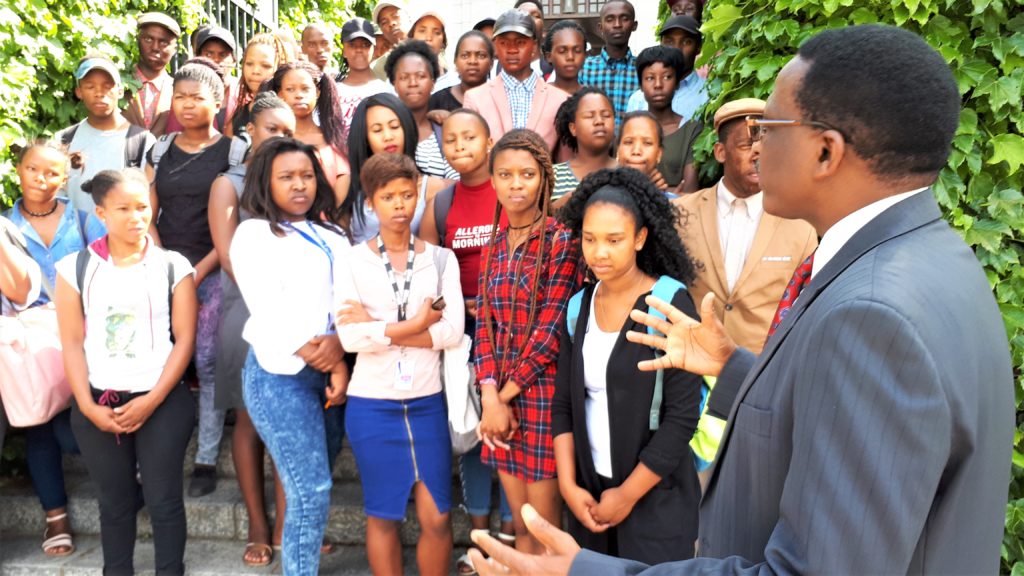Gadra’s pioneering matric school considers expanding to other EC cities writes MOEKETSI MOGALE
The Gadra Matric School’s (GMS) lockdown teaching experiences may have opened the way for its expansion into other parts of the Eastern Cape.
Gadra Education manager Dr Ashley Westaway said GMS’s online teaching experiments in April and May were “sufficiently positive and interesting for us to think that it might be possible to expand in the future”.
Many potential GMS learners from other parts of the province cannot afford a year of rent and other living expenses in Makhanda away from home.
“The pandemic has made us, for the first time as an organisation, imagine having different forms of Gadra in different cities in the province. Students could come in a for a face-to-face block once a term, and the rest of the educational experience may be online support.”
“It has enabled us to imagine things that we weren’t able to imagine before. Wherever there is a large enough academic culture – like Port Elizabeth or East London – we can start thinking about replicating a version of the school.
“So, there’s been some positive strategic thinking that’s come out of this pandemic.”
The GMS currently provides a one-year fulltime programme of classes to prepare students to rewirte selected Matric subjects. Since 1994, over 2000 students have graduated with an improved matric.
It has become a top-end bridging school and has been the primary feeder school for Rhodes University for some years.
But, could Gadra’s successful partnership with Rhodes University be replicated with other Eastern Cape universities, such as Nelson Mandela University and Fort Hare, if Gadra branches out into other areas like East London and Port Elizabeth?
The Rhodes bridging programme currently allows GMS learners to register for one university module in tandem with their matric upgrades, enabling them to secure a university credit they can carry forward into fulltime study.
“This relationship with Rhodes is very special and strong, and we are very grateful for it. We are proud that we can help so many students from no fees schools to access the university. It takes an enormous amount to reach a point like this. We would have to educate other universities, as they don’t understand the concept of upgrading,” Westaway says.
“Rhodes knows that our mid-year exams are NSC level – they know we are not tricking anyone here. It is a genuine, high-quality mid-year exam. When Rhodes gets GMS applications, they know that can be trusted. It is a legitimate educational enterprise.”
Demand for spaces at GMS has rocketed in the recent past, and the school currently accommodates over 200 learners, the biggest matric cohort in the city by some distance.
GMS has steered a brave and steady course through the pandemic.
And, WhatsApp emerged as one of its more unlikely educational heroes after the GMS was forced to lock down.
Kwakhanya Malahle, who is currently writing final exams to upgrade his Afrikaans, Mathematics and Physical Science marks at the GMS, credits his teachers’ use of WhatsApp for “nailing” his midyear exams and emerging top of his Physics class.
“It turned out perfectly. I was relieved when our teachers used social media to not only communicate with us but to educate us and encourage us to hand in our home activities and other given assessments through this platform,” Malahle says.
Rhodes provisionally accepted Malahle on the strength of his results. “This served as motivation – it inspired me to keep pushing as I saw my dreams of studying Environmental Sciences gets closer.”
“When we were told that we wouldn’t be attending classes any more due to Covid-19, some learners were excited about the lockdown, as this meant more time at home with family. But I was sad and worried about my future. I didn’t want to see myself coming back to Grahamstown next year to repeat what I should have finished this year.
“I never liked the idea of being home for three months and learning on my own, without any guidance. I was excited and felt the relief of knowing I had support,” Malahle says.
Later, once face-to-face classes resumed, everything that had been covered online was covered again.
As a text-based teaching tool, WhatsApp has some powerful advantages. Gadra Education manager Dr Ashley Westaway says WhatsApp text teaching encourages learners to read more, rather than simply listen.
One of the biggest complaints about South African education is that learners don’t read enough. And for this reason, Westaway believes WhatsApp text teaching could be included in post-Covid-19 teaching.
“I am a big advocate of summarising as a foundational study tool. If WhatsApp text teaching becomes institutionalised as one of the steps in the summarising process, then I am convinced that it would be useful,” says Westaway.
Westaway says GMS is proud of the courses they are running, like writing skills. “We are not just teaching school subjects – we are preparing our students for university.”
He says his extensive interactions with learners during the lockdown revealed that some found online learning beneficial, while others said they preferred physical classes.


